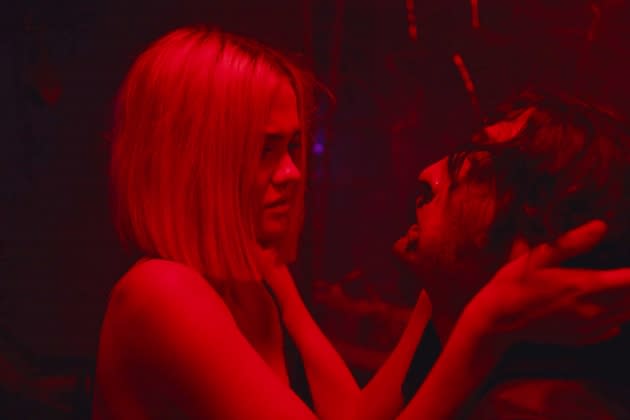‘No Way Out’ Review: A Middling Modern L.A. Noir That Tracks Love and Its Trail of Bodies

The femme fatale is alive and well in Los Angeles-set indie “No Way Out,” an old-fashioned noir dressed up in the steamy decadence of an erotic thriller. Trouble is, veteran producer Keith Kjarval’s debut solo screenplay doesn’t provide the kind of memorable characters or sharp plotting needed to punch across a dark crime melodrama. Nor does first-time feature director Azi Rahman’s reasonably stylish walk on the wild side seduce sufficiently as a stylistic exercise, reaching for “Irreversible”-esque shock value without ever seeming very surprising or transgressive.
There’s enough sex and violence here to hold attention for an hour and a half, but the care or conviction to explain why it all happens — let alone why viewers should care — proves elusive. Vertical Entertainment is opening the film on a handful of U.S. theater screens on August 8, simultaneous with release to digital and VOD, where its primary audience will be found.
More from Variety
New 'Saw' Movie Set for October 2023, 'Saw VI' Director Returning
Viola Davis to Star in 'Hunger Games' Prequel 'The Ballad of Songbirds and Snakes' as Head Gamemaker
Following a de rigueur opening tease of bloody mayhem to come, we meet Nick (Joey Bicicchi) taking photos on the beach, his attention arrested by Australian bottle blonde Tessa (Maia Mitchell). When he’s snapped her several times, she feigns annoyance at this “stalker” — but also seems to be running late for their blind coffee date. As both appear to be competing for the prize of Most Jaded & Flippant, that date doesn’t go too promisingly. So it’s unexpected when she later turns up on his doorstep bearing party drugs, thus commencing a long day of urban frolicking that ends with a long night in bed.
He’s taken aback the next morning to find her going through his computer files. But she claims she’s just impressed by his photography, and wants to help his career — which, indeed, soon takes an upturn into realms of high-end fashion shoots and insider connections like the rather obnoxious style maven Nemo (Guy Burnet). After several music video-like montages of mutual bliss, however, she wigs out seeing some sketchy-looking guys at a private shindig and insists that she has to leave town. Turns out the men glimpsed had seemingly drugged, sexually assaulted and filmed her at another fete when she was new to L.A. some months earlier. She didn’t pursue it with police upon being told the perps can’t be crossed without inviting even greater harm.
Nick begs her to stay, their conversation escalating in record time to this request: “Do you love me? Then kill them!” His understandable balking is even quicker. Up to that point an OK if not particularly involving hipster romance, “No Way Out” requires far too much suspension of disbelief in asking us to accept our hero’s sudden switch to Lethal Avenger. Is he that impulsive, or even that blinded by love? While the leads (both also executive producers here) give decent enough performances, the script provides them with little character definition beyond “so hot for each other,” and frankly that chemistry isn’t overwhelming.
The muddled thriller that ensues has Bicicchi going from your stereotypically five-o’-clock-shadowed, chain-smoking, Vincent Gallo-looking “moody downtown artist” type to blood-drenched fury making animalistic grunts between bring-downs. A more surreal or otherwise abstracted approach might have conceivably made that work. But this film doesn’t achieve any overall dream-to-nightmare feverishness; instead, it remains a fairly literal-minded potboiler with an exceptional number of psychological and narrative gaps. The fadeout rings hollow because there’s no real payoff: Tessa turns out to be a different person than Nick (if not the viewer) expected, albeit sans the slightest hint of her motivation, backstory, anything.
Rahman does not neglect to drape the bare-bones narrative in clubby neon lighting hues, or soundtrack it with a lot of moderately edgy various-artists tracks, some musicians utilized also among the cast members. Held in reserve save at beginning and end, Tim Tontijo’s original score by contrast pours on a full-on traditional suspense hysteria the movie can’t quite support. It’s all good-looking and pacy enough, even if the trappings of moneyed excess laid on for “dangerous underworld” atmospherics feel unconvincing as well as familiar: Our leads attend raves with back rooms for kinky sexual play, and under duress Nick’s photo shoots begin turning into Helmut Newton-like displays of violent perversity. Yes, yes, we’ve all seen “The Eyes of Laura Mars,” too.
The best performance is given by Katelyn Pippy as Nick’s supportive manager Sammy — the only person here who isn’t a thin construct, and who might conceivably know their way around L.A.’s velvet-rope and underground spheres alike. A flinty, adaptable wearer of many hats, Sammy is easy to recognize as someone who lives in the real industry-town world of these locations. “No Way Out’s” other characters, alas, are recognizable only as pale copies of equivalent figures in prior, better neo-noirish films.
Best of Variety
Sign up for Variety’s Newsletter. For the latest news, follow us on Facebook, Twitter, and Instagram.

